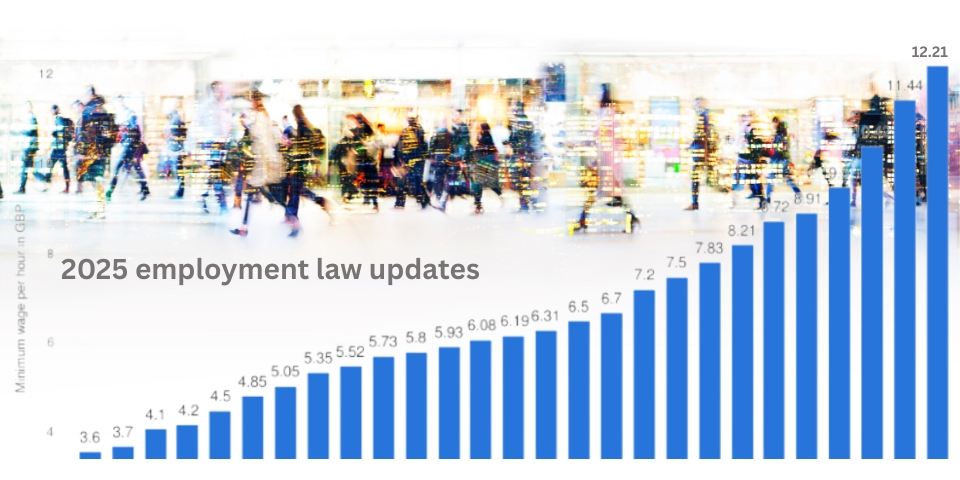Estimated reading time: 4 minutes
As we move into Autumn 2025, the UK employment law landscape is shifting — with the Employment Rights Bill set to become Law this quarter, major reforms are on the way that will require action from employers. The timeline of measures, the implications for employers, and the steps you can take to prepare now are covered in our dedicated article Employment Rights Bill : what employers need to know about the 2026-2027 reforms.
Below, we’ve listed the routine employment law updates that came into effect in April 2025, alongside the new family right that provides a new leave and pay entitlement for parents with a baby in neonatal care.
1 April 2025 Increases to National Minimum Wage and National Living Wage
National Living Wage (for those 21 and over) increased to £12.21 an hour, up from £11.44.
National Minimum Wage for 18-to-20 year-olds increased to £10.00, up from £8.60.
National Minimum Wage for those under 18, and for apprentices increased to £7.55 from £6.40.
The daily accommodation offset rate is £10.66.
This is the amount that employers can count towards the NMW or NLW when they provide accommodation to workers.
The 2025 rates changes represent the largest increase for under 21s on record, and form part of the Government’s aim to establish a single adult minimum wage rate applying to those workers aged 18 years and over. (The Employment Rights Bill will remove what the Government describes as “discriminatory age bands” so that all adults of 18 and over are entitled to the same minimum wage.)
6th April 2025 annual increases to statutory payments and tribunal awards payments 2025-2026
The statutory payments also rose in line with the usual annual inflation-linked increases in April. Our one page Factsheet provides an an overview of all the increases to the NMW, statutory and tribunal awards payments and limits.
From April 6, 2025, the maximum amount of a “week’s pay” used for calculating statutory redundancy pay and other payments like the basic award for unfair dismissal, increased from £700 to £719.
The maximum compensatory award for unfair dismissal also increased from £115,115 to £118,223, (or a year’s pay, whichever is lower).
From April 6th 2025, the statutory payment for Statutory Sick Pay (SSP) paid after the first three “waiting days” of sickness, increased to £118.75 per week.
Note that SSP will become a day one right from April 2026, under the Employment Rights Act- the 3 “waiting days” period will be scrapped so that an employee will receive SSP from day 1 of sickness. It will be extended also to those earning less than the Lower Earnings threshold. For these workers, SSP will be calculated at 80% of their normal weekly earnings, instead of the flat weekly rate.
Ensure payroll systems are up to date and managers handling internal processes, settlement discussions and so on are informed of the new limits. Employers will need to plan for more short term sickness absence. More details on the actionable steps to take in our article on the Employment Rights Bill reforms for 2026-2027.
Family Rights
The Neonatal Care (Leave and Pay) Act 2023 came into effect on 6 April 2025 and provides a new leave and pay entitlement for parents with a baby in neonatal care. This new leave and pay entitlement gives eligible parents the right to have up to 12 weeks leave (depending on how long their baby is in neonatal care for).
Parents may be eligible if:
- their baby was born on or after 6 April 2025
- their baby spends 7 days or more in a row in neonatal care
- they are the baby’s parents or partner of the baby’s mother, and have caring responsibility for the baby, and
- they are taking the leave to care for the baby.
Acas has published guidance to neonatal care leave and pay here
It’s important to note that the parent will also need to meet the eligibility criteria as an employee (i.e be classed as an employee).
The new right to this leave applies from the first day of work and eligible parents who have been continuously employed by their employer for at least 26 weeks up to the end of what is called the “qualifying week” have the right to neonatal pay as well as the leave.
For more guidance, on 22 August 2025, the Government published a technical guide for employers on NCL and SNCP.
The Government will also consult on extending the right to NCL and SNCP to parents of critically ill children up to the age of 16 in 2026.
Steps to take now
If you haven’t already, update your family policies to include provision for neonatal care leave, and make sure that employees are aware of the changes.
More information on the family friendly laws that came in 2023 and 2024, and including the expansion of free childcare support in Autumn 2025, can be found in Ann Gibbon’s article on recent laws supporting new parents.






